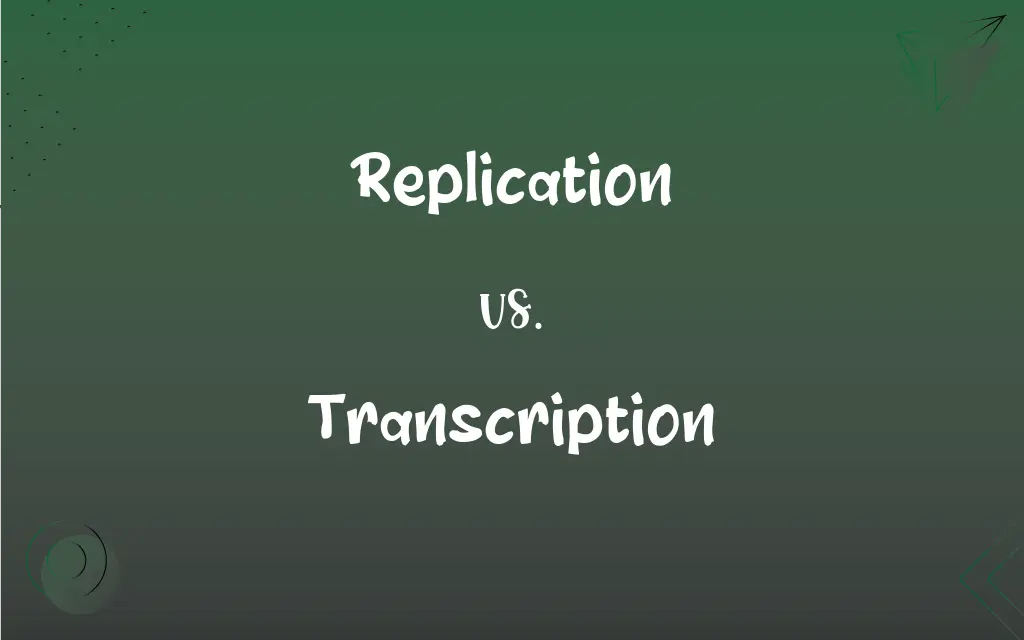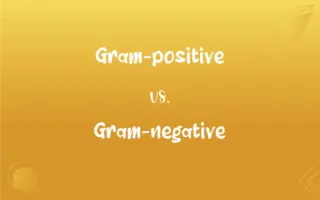Replication vs. Transcription: What's the Difference?
Edited by Janet White || By Aimie Carlson || Updated on October 18, 2023
Replication is the process of copying DNA; transcription converts DNA to RNA.

Key Differences
Replication is a fundamental process that occurs in the cell cycle to ensure that each daughter cell receives an exact copy of the parent cell's DNA. Transcription, on the other hand, is a step in gene expression where a segment of DNA is used as a template to synthesize RNA.
Replication ensures genetic continuity from one generation to the next by duplicating the entire DNA. In contrast, transcription produces RNA molecules that play roles in protein synthesis and other cellular functions.
In replication, enzymes like DNA polymerase copy the DNA strands to produce two identical DNA molecules. During transcription, RNA polymerase reads the DNA sequence and creates a complementary RNA strand.
The main objective of replication is to preserve the genetic information for the next generation. Transcription serves to regulate and execute the expression of that information within the current generation.
Replication takes place in the nucleus of eukaryotic cells and throughout the cell in prokaryotes. Transcription, while initiated in the nucleus in eukaryotes, often has its products function in the cytoplasm.
ADVERTISEMENT
Comparison Chart
Purpose
Copies entire DNA
Produces RNA from DNA
Enzyme Involved
DNA Polymerase
RNA Polymerase
Resulting Molecule
DNA
RNA
Location in Eukaryotes
Nucleus
Initiated in nucleus, functions often in cytoplasm
Role in Gene Expression
Preservation of genetic info
Regulation and execution of genetic info
ADVERTISEMENT
Replication and Transcription Definitions
Replication
Replication is the act of reproducing or copying.
The replication of the artwork was indistinguishable from the original.
Transcription
Transcription refers to the process of creating RNA from DNA.
During transcription, RNA polymerase synthesizes RNA molecules.
Replication
Replication denotes the act of answering or replying.
His replication to the allegations was firm and concise.
Transcription
Transcription can mean a written or printed version of something.
The transcription of the old manuscript revealed its secrets.
Replication
Replication is the repetition of an experiment to confirm findings.
Scientists stressed the importance of replication to verify the research results.
Transcription
Transcription is the act of writing down something spoken.
She was hired for the transcription of the interviews.
Replication
Replication can mean the echo or reproduction of sound.
The replication of the concert in the recording was flawless.
Transcription
Transcription denotes a detailed written record of a legal proceeding.
The court required an official transcription of the testimony.
Replication
Replication refers to the duplication of DNA molecules.
In cell division, DNA replication ensures each daughter cell has the same genetic information.
Transcription
Transcription is the arrangement of a piece of music for a different instrument.
The transcription for piano captured the essence of the orchestral piece.
Replication
The act or process of replicating something.
Transcription
The act or process of transcribing.
Replication
(Biology) The process by which genetic material, a single-celled organism, or a virus reproduces or makes a copy of itself.
Transcription
(Music) An adaptation of a composition.
FAQs
What is replication?
A process where DNA is copied to produce identical DNA molecules.
Are replication and transcription the same?
No, replication duplicates DNA, while transcription produces RNA.
Where does transcription take place in eukaryotes?
It starts in the nucleus and often functions in the cytoplasm.
What is transcription?
A process where DNA serves as a template to synthesize RNA.
Where does replication occur in eukaryotic cells?
In the nucleus.
What role does transcription play in cells?
It regulates and executes gene expression.
Which enzyme plays a key role in transcription?
RNA Polymerase.
What's the outcome of replication?
Two identical DNA molecules.
Does replication involve RNA?
Only briefly, as RNA primers help initiate the process.
Why is replication important?
It ensures genetic continuity for the next generation.
Can a mistake in replication lead to mutations?
Yes, errors in replication can cause genetic mutations.
What's the outcome of transcription?
RNA molecules, like mRNA, tRNA, or rRNA.
Can transcription work without replication?
Yes, cells can transcribe genes without replicating the entire DNA.
Which enzyme is crucial for replication?
DNA Polymerase.
Does transcription always produce proteins?
No, only when the RNA is translated into proteins.
How is transcription regulated?
By various cellular signals and molecules that activate or inhibit the process.
Is transcription involved in protein synthesis?
Yes, it's the first step, producing mRNA which is then translated into proteins.
How often does replication occur in cells?
Once per cell cycle, before cell division.
Is replication a continuous process?
No, it occurs once per cell cycle.
Are both replication and transcription essential for life?
Yes, both processes are fundamental for growth, development, and function of organisms.
About Author
Written by
Aimie CarlsonAimie Carlson, holding a master's degree in English literature, is a fervent English language enthusiast. She lends her writing talents to Difference Wiki, a prominent website that specializes in comparisons, offering readers insightful analyses that both captivate and inform.
Edited by
Janet WhiteJanet White has been an esteemed writer and blogger for Difference Wiki. Holding a Master's degree in Science and Medical Journalism from the prestigious Boston University, she has consistently demonstrated her expertise and passion for her field. When she's not immersed in her work, Janet relishes her time exercising, delving into a good book, and cherishing moments with friends and family.































































